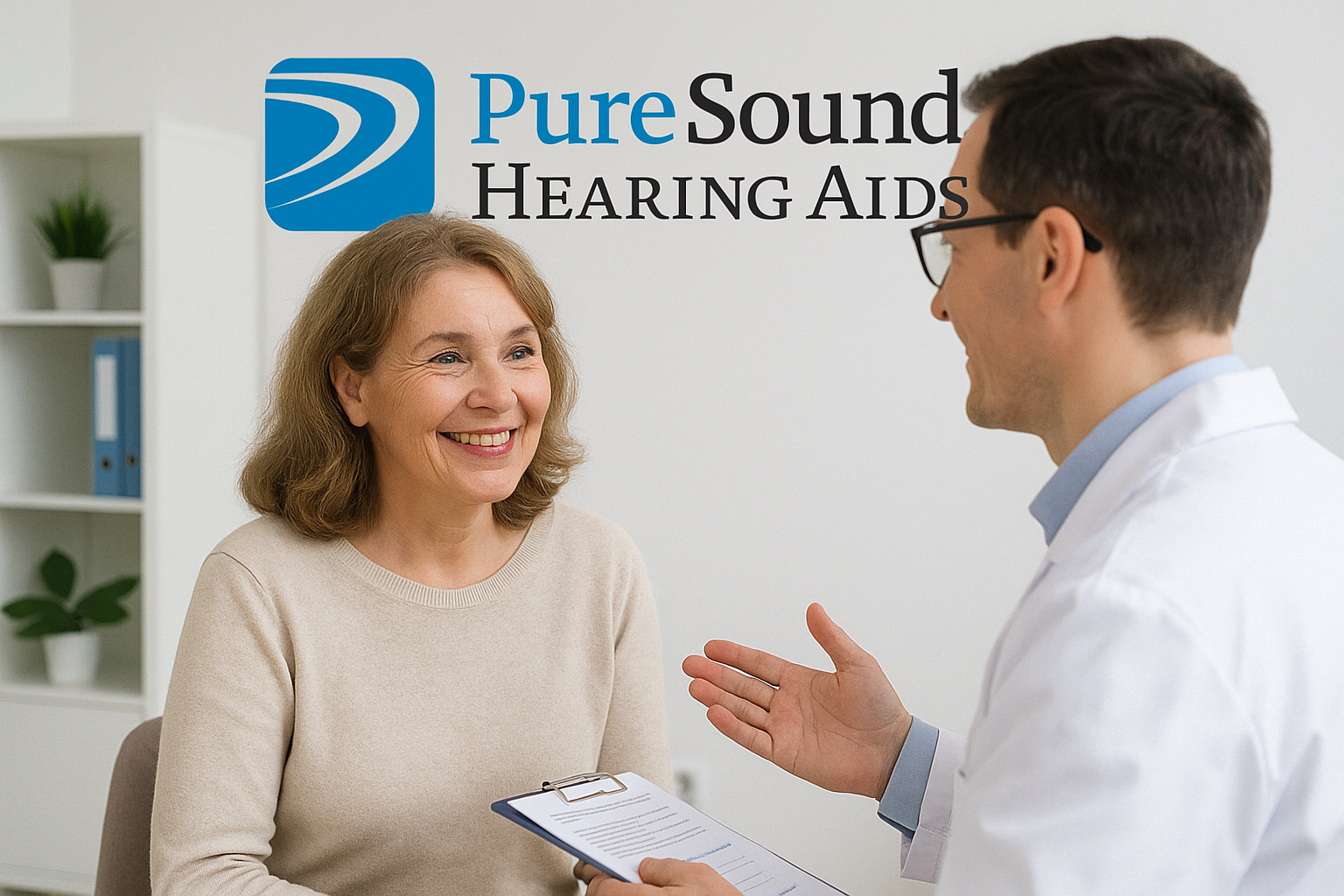Hearing loss affects millions of Americans, yet many people don’t fully understand how it happens, what it means for everyday life, or how it can be treated. Whether you’re beginning to notice changes in your own hearing or supporting a loved one, this guide will give you a clear overview of hearing loss—what it is, why it matters, and what you can do about it.
At Pure Sound Hearing Aids, we believe education is the first step toward better hearing. Let’s explore the basics together.
What Is Hearing Loss?
Hearing loss is a partial or total inability to hear sounds in one or both ears. It can develop gradually over time or occur suddenly due to injury or illness. Some people may notice they can’t hear certain pitches clearly, while others may struggle with understanding speech, especially in noisy environments.
Common Signs of Hearing Loss:
- Asking people to repeat themselves often
- Turning up the TV or radio louder than others prefer
- Struggling to follow conversations in group settings
- Ringing or buzzing in the ears (tinnitus)
- Avoiding social situations due to hearing difficulties
If any of these sound familiar, it’s a good idea to schedule a hearing evaluation.
Types of Hearing Loss
There are three main types of hearing loss, and understanding which one you have is key to finding the right solution.
1. Sensorineural Hearing Loss
This is the most common type and occurs when the inner ear or the hearing nerve is damaged. It’s usually permanent and caused by:
- Aging (presbycusis)
- Noise exposure
- Certain medications
- Head trauma
- Illness or genetic conditions
Prescription hearing aids are the most common and effective treatment.
2. Conductive Hearing Loss
This type results from blockages or problems in the outer or middle ear. Common causes include:
- Earwax buildup
- Fluid in the middle ear
- Ear infections
- Eardrum damage
- Bone abnormalities
In some cases, medical treatment or surgery can restore hearing. In others, hearing aids may be recommended.
3. Mixed Hearing Loss
This is a combination of sensorineural and conductive hearing loss. It may require both medical treatment and prescription hearing aids for best results.
What Causes Hearing Loss?
Hearing loss can stem from a wide variety of causes. Some are preventable, while others are simply part of aging.
Common Causes:
- Aging: Natural wear and tear on the inner ear
- Loud noises: Repeated exposure to high-decibel sounds
- Infections: Middle ear infections or viruses affecting hearing nerves
- Injury: Head trauma or sudden loud blasts (like fireworks or gunshots)
- Genetics: A family history of hearing loss
- Health conditions: Diabetes, heart disease, or untreated high blood pressure
In addition, keeping regular health checkups and consistently protecting your ears from noise can help reduce your risk.
How Hearing Loss Affects Daily Life
Hearing loss doesn’t just affect your ears—it can impact your entire well-being. Struggling to hear can lead to:
- Social isolation
- Fatigue from straining to understand conversations
- Decreased job performance
- Safety concerns (like missing alarms or traffic sounds)
- Increased risk of cognitive decline and dementia
Fortunately, treating hearing loss can reverse many of these effects. In fact, studies show that wearing hearing aids can improve your mood, memory, and quality of life.
When to Seek Help
Many people wait years before getting help for hearing loss. But the sooner you take action, the better your outcomes will be.
If you’re noticing signs of hearing loss, or loved ones have pointed it out, don’t delay. A hearing care provider can perform a simple, painless hearing test and recommend the best next steps.
At Pure Sound Hearing Aids, our caring specialists are here to help you every step of the way—from your first screening to choosing the right hearing solution for your needs and budget.
Next Steps: What You Can Do Today
To get started, here are a few ways you can take charge of your hearing health right now:
Schedule a free hearing test – It only takes a few minutes to learn your baseline.
Protect your hearing – Wear earplugs when around loud machinery, concerts, or power tools.
Stay informed – Follow reliable sources like the National Institute on Deafness and Other Communication Disorders (NIDCD) for up-to-date information.
Explore your options – Learn about the latest in hearing aid technology, from rechargeable devices to Bluetooth streaming.
Pure Sound Is Here for You
Hearing loss can feel overwhelming, but you’re not alone. At Pure Sound Hearing Aids, we’ve helped thousands of people rediscover the sounds they’ve been missing—from laughter and conversation to the birds singing outside your window.
Whether you’re just starting your journey or ready to try prescription hearing aids, we’re here to make the process simple, affordable, and comfortable.
📞 Call today to schedule your free hearing evaluation or visit one of our convenient locations in central Pennsylvania. We’re proud to be your local experts in hearing care.

